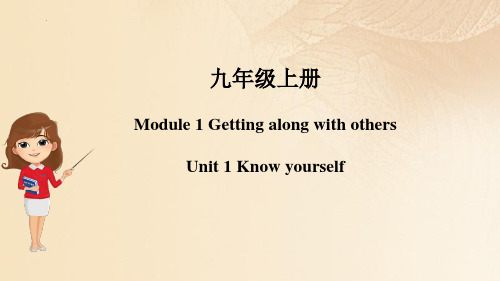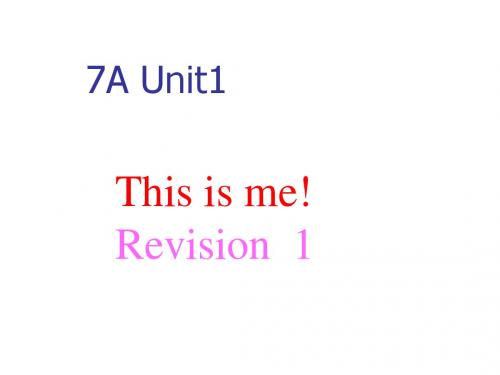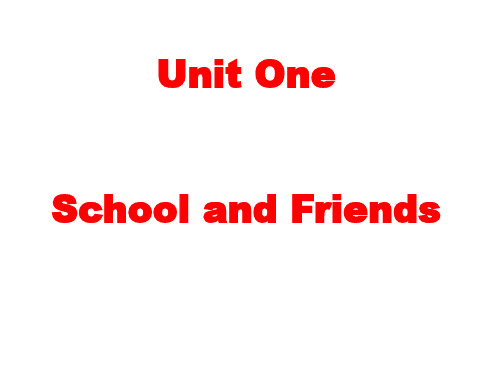unit1 复习课件
合集下载
仁爱版九年级英语第一单元Unit 1 The Changing World 复习课件(共13张PPT)

with the development of China .
China has developed rapidly.
13.There goes the bell.
14.More sorts of leisure activities.更多种类的业余活动
15。 improve(动)
educate (动) communicate (动)
He has had the VCD since yesterday./for one day.
(2)She borrowed this book three days ago.
She has kept this book for three days ./since three days ago.
three quarters3/4 , a half/one half ½
(2)分数+ of +复数名词:Three fifths of students are girls.
Three fifths of the population is Chinese.
(3)百分数。”基数词+percent”
(3)He left the park at 8:00.
He has been away from the park since 8 o’clock. 4,书上P20 2b (表格及笔记动词) ,P17 1c
二,合成词。(书上P18 3)
三,词组。 决定某事 decide on +名词
决定做某事 decide to do sth.
improvement (名词) education (名) communication(名)
提高
教育
九上英语课件 Unit1【复习课件】

6.Su Ning gave up her job as an
accountant five years ago and
started to work for the sales
department in a big company. (P8) [短语]give sth. up 放弃某物(动副结 构)
4.对我来说整天工作不说话是可怕的。 It's___te__r_ri_b_l_e__f_o_r__m__e_____ to work__w__it_h_o__u_t__s_p_e_a__k_in__g__a_l_l _d_a__y_l_o_n__g_____.
5.我只能一天又一天地跟数字打交道。 I could only_w__o_r_k__w__it_h_______numbersd_a__y_a__ft_e__r_d_a__y_____________.
order n. 名词 “顺序”
in the correct/right order 按照正确的顺序
in the alphabetical order 按照字母表顺序
in a different order
以另一种顺序
3. But he is modest and never shows off.(P7) show off 炫耀,卖弄(能力、财力、智力等) 她从不炫耀。
e.g. 她献出了年轻的生命。 She devoted her young life.
11.It is you who shape your life and your future.(16) 句中“It is + 被强调的部分 + who/that + 原句其他部分”是一种强 调句型,用于加强语气。
七年级英语上册Unit1复习课件

es” to the verbs
Most verbs +s walk live walks lives
Verbs ending in a consonant +y
-y + ies fly study + es
flies studies
Verbs ending in ss, ch, sh or x
Celebrity profile
Liu Xiang Name :__________ 23 Age:____________
Shanghai Birthplace:_______ sportsman Job:____________ Appearance:______ tall _______________ and strong Playing Hobby:__________ computer games, singing He is good at:____ running _______________
runs (run) every morning. 1.Tom ______ running (run). He _____(be) good at _________ is like reading 2.We _______(like) _______(read). Do like reading ____(do) you ____(like) _______(read)? go shopping 3.My parents ______(go) _________(shop) every shopping Sunday. They ______(love) _________(shop). love come 4.Daniel and Sandy ______(come) from Beijing. living They enjoy ________(live) there. sitting 5.Mr Wu doesn’t ___________(not like) ________(sit) in like his office. He ______(love) _____(do) sports and loves doing playing he ______(be) clever at _______(play) tennis. is
Most verbs +s walk live walks lives
Verbs ending in a consonant +y
-y + ies fly study + es
flies studies
Verbs ending in ss, ch, sh or x
Celebrity profile
Liu Xiang Name :__________ 23 Age:____________
Shanghai Birthplace:_______ sportsman Job:____________ Appearance:______ tall _______________ and strong Playing Hobby:__________ computer games, singing He is good at:____ running _______________
runs (run) every morning. 1.Tom ______ running (run). He _____(be) good at _________ is like reading 2.We _______(like) _______(read). Do like reading ____(do) you ____(like) _______(read)? go shopping 3.My parents ______(go) _________(shop) every shopping Sunday. They ______(love) _________(shop). love come 4.Daniel and Sandy ______(come) from Beijing. living They enjoy ________(live) there. sitting 5.Mr Wu doesn’t ___________(not like) ________(sit) in like his office. He ______(love) _____(do) sports and loves doing playing he ______(be) clever at _______(play) tennis. is
冀教版七年级英语上册Unit 1单元复习课件(共19张PPT)

Unit One School and Friends
重点复习内容
1. I’m Danny. (同义句) _M_y__ _n_a_m__e__ is Danny. He is Li Ming.(同义句) _H__is__ _n_a__m__e_ is Li Ming. She is Jenny.(同义句) _H__e_r_ _n__a_m__e__ is Jenny.
D. me
句型转换
1. I like that sweater. ( 改为否定句) I d__o_n_’_t__li_k_e__ that sweater?
2. Do you like blue? (否定回答) No, __I_ _d_o__n_’_t_.
3. They are her clothes(划线提问) _W__h_o__s_e_ clothes are they?
A: _W__h_a_t_’_s_ that? B: It’s a pencil. A: _I_s__ that your pencil? B: Yes, it is. I write _w__i_t_h_ it, A: _H__o_w__ _m__a_n_y_ pencils do you have? B: I have three. A: _E_x_c__u_s_e_ me. _M__a_y__ I borrow your ruler? B: Sure. _H__e_r_e_ __y_o_u__ __a_r_e___. A: Thank you. B: You’re _w__e_l_c_o__m__e_.
7. ---May I have a book? ---Sure! __A____.
A. Here you are
B. Here he is
重点复习内容
1. I’m Danny. (同义句) _M_y__ _n_a_m__e__ is Danny. He is Li Ming.(同义句) _H__is__ _n_a__m__e_ is Li Ming. She is Jenny.(同义句) _H__e_r_ _n__a_m__e__ is Jenny.
D. me
句型转换
1. I like that sweater. ( 改为否定句) I d__o_n_’_t__li_k_e__ that sweater?
2. Do you like blue? (否定回答) No, __I_ _d_o__n_’_t_.
3. They are her clothes(划线提问) _W__h_o__s_e_ clothes are they?
A: _W__h_a_t_’_s_ that? B: It’s a pencil. A: _I_s__ that your pencil? B: Yes, it is. I write _w__i_t_h_ it, A: _H__o_w__ _m__a_n_y_ pencils do you have? B: I have three. A: _E_x_c__u_s_e_ me. _M__a_y__ I borrow your ruler? B: Sure. _H__e_r_e_ __y_o_u__ __a_r_e___. A: Thank you. B: You’re _w__e_l_c_o__m__e_.
7. ---May I have a book? ---Sure! __A____.
A. Here you are
B. Here he is
2024(人教版)英语七年级上册 Unit 1 单元复习课件

考点突破
4.中英文名字表达差异
① The boy is Jack Smith. His ________ is Jack.
A. first name B. last name C. family name D. middle name ② —What’s her name? —Chen Jie. Jie is her ________.
Unit 1 My name’s Gina.
单元复习课
Read the following words, and judge F (first name) or L (last name).
1.Tony
F
2.Brown
L
3.Miller
L
4.Xiaohua F
5.Alice
F
6.Jack
F
7.Black L
be 动词有三种形式,即 am、is、are。
(2)be 动词的用法:
be
主语
示例
am 第一人称单数 I
I am a student. 我是一名学生。
is
she、he、it、单数可数名 词或不可数名词
She is my good friend. 她是我的好朋友。
we、you、they、可数名词 Helen and Cindy are in China. are 复数或表示复数意义的单 海伦和辛迪在中国。
语法突破
2.形容词性物主代词
(1)英语中形容词性物主代词有下面这些:
知识 复现
第一人称 第二人称
第三人称
my (我的) our (我们的) your (你的;你们的) his (他的) her (她的) its (它的) their (他们的;它们的)
人教版七年级上Unit1复习课件

• —Gina.
• A. her B. his
C. you
D. it’s
• My friend is in China. 我的朋友在中国。(Page 5 2b) • (1)"Sb+be动词+in+地点"表示"某人在某地"。 • ►His friend is in Beijing. 他的朋友在北京。 • (2)friend可数名词,意为"朋友"。常用短语mak
• 4)特殊疑问句: 疑问词 + be + 主语(其他成分)+
•
What's your name?
be的用法口诀: 我用am,你用are, is跟着他、她、它 单数is,复数are,勿忘be的三变化 变疑问,往前提,句末问号莫丢弃 变否定,更容易,be后not莫忘记。 疑问否定任你变,句首大写莫迟疑
•
• be动词的在一般现在时中的各种句型
• 1)肯定句: 主语 + be + 其他成分
•
She is beautiful.
• 2)否定句: 主语 + be + not + 其他成分
•
She is not beautiful.
• 3)一般疑问句(用yes或no来回答):be + 主语 +其
•
Is she beautiful?
•
•随堂检测
语法归纳
•一般现在时中be动词的用法
•
be
am
is are
语法归纳
根据主语进行确定 (1)am用在I后 I am a student. I'm happy. (2)are用于复数主语和第二人称单数(你,您 Are you Chinese? They are basketball players. The books are expensive. (3)is用在主语是第三人称单数或不可数名词等 He is my friend. The dog is yellow.
人教课标新教材必修1Unit1复习课教学课件

preference n. 偏爱;优先权;偏爱的事物 have a preference for 对……偏爱 in preference to… 而不是…… preferable adj. 更可取的,更合适的
prefer不用于进行时态。prefer to do sth中的to是不定式, prefer (doing) sth to (doing) sth中的to 是介词。
→ ___p_r_e_fe_r_a_b_le____ adj. 较适合;更可取 → ___p_r_e_fe_r_a_b_ly____ adv. 更可取地 3. move vi. 移动;搬家,迁移;离开 vt. 移动;感动 → ___m_o_v_e_m__e_n_t ___ n. 动作;运动;活动
4. suit vt. 适合;中……的意 n. 诉讼;诉讼案;套装,一套衣服 → ____s_u_i_ta_b_l_e____ adj. 合适的;适用的 5. actual adj. 实际的 → _____ac_t_u_a_ll_y____ adv. 事实上;的确 6. challenge n. 挑战;艰巨任务 vt. 怀疑;向……挑战 → ___c_h_a_l_le_n_g_e_r___ n. 挑战者 → __c_h_a_ll_e_n_g_in_g____ adj. 挑战性的
17. addict n. 对……入迷的人;吸毒成瘾的人 vt. 使上 瘾→a_d_d_ic_t_ed_________ adj. 有瘾的;上瘾的;入迷的 → _a_d_d_i_c_ti_o_n______ n. 瘾;嗜好 → __a_d_d_ic_t_iv_e______ adj. 使人上瘾的
1. p_r_e_f_e_r…__t_o_…_________ 喜欢……多于…… 2. c_l_e_a_n_u_p____________ 打扫(或清除)干净 3. _su_i_t_ab_l_e_f_o_r_________ 对……适合的 4. t_a_k_e_c_o_u_r_s_es_________上课 5. _si_g_n_u_p__(_fo_r_s_t_h_)_____报名(参加课程) 6. _o_n_m__y_o_w__n_________单独地,独自地 7. _m_a_k_e_t_h_e_t_e_a_m_______加入球队 8. _h_a_n_d_o_u_t___________分发
人教版高中英语必修一Unit 1(单元复习课件) (共43张PPT)

Talented as he is, he is not yet ready to turn professional. (conj.)尽管,即使 As we expected, they won the game. (关系代词) 引导非限制性定语从句,“正如……”
Treat me as a friend. (prep.) 充当,当作
10. 中断这段友谊 end the friendship 11. 高中 senior high school 12. 与某人交往 communicate with sb. 13. 如您能给我提出建议,我会非常感激的。I would be grateful if you could give me some advice. 14. 挑出错误 pick out mistakes 15. …是一个好习惯 it’s a good habit of… 16. 表达思想感情 express/convey one’s thoughts and feelings
It is/was+被强调部分+that/who+句子剩余部分 she met Tom in the street yesterday. It was yesterday that she met Tom in the street. It was Tom that she met in the street yesterday. Was it yesterday that she met Tom in the street? Is/Was it+被强调部分+that/who+句子剩余部分 When was it that she met Tom in the street? 特殊疑问词+ is/was it + that/who 句子其余部分 I don’t know _________________ she met Tom in the street.
Treat me as a friend. (prep.) 充当,当作
10. 中断这段友谊 end the friendship 11. 高中 senior high school 12. 与某人交往 communicate with sb. 13. 如您能给我提出建议,我会非常感激的。I would be grateful if you could give me some advice. 14. 挑出错误 pick out mistakes 15. …是一个好习惯 it’s a good habit of… 16. 表达思想感情 express/convey one’s thoughts and feelings
It is/was+被强调部分+that/who+句子剩余部分 she met Tom in the street yesterday. It was yesterday that she met Tom in the street. It was Tom that she met in the street yesterday. Was it yesterday that she met Tom in the street? Is/Was it+被强调部分+that/who+句子剩余部分 When was it that she met Tom in the street? 特殊疑问词+ is/was it + that/who 句子其余部分 I don’t know _________________ she met Tom in the street.
- 1、下载文档前请自行甄别文档内容的完整性,平台不提供额外的编辑、内容补充、找答案等附加服务。
- 2、"仅部分预览"的文档,不可在线预览部分如存在完整性等问题,可反馈申请退款(可完整预览的文档不适用该条件!)。
- 3、如文档侵犯您的权益,请联系客服反馈,我们会尽快为您处理(人工客服工作时间:9:00-18:30)。
I will/shall arrive tomorrow . 我明天到. Will you be busy today ? 你今晚忙吗? 将来我要成为一名工程师。 I will be an engineer in the future.
I won’t be an engineer in the future. Will you be an engineer in the future? He will come back to school tomorrow.
词语对对碰
Will people have robots?
相同点: 这两个词后都可接时间,表示“在 · · · · · · 以后” 不同点: ⒈“in+一段时间”表示以现在为起点的将来一段时间以后,常与将来时连用.
in vs after
⒉“after+一段时间”表示以过去某一时间点开始的一段时间以后,常于一般 过去时连用. 当after后接某一时间点时,仍可用于将来时.
① It’ll be finished _____ five minutes. in ② He will go to the park ______supper. after ③ I’ll be free ______ nine o’clock. after in ④ It’s two o’clock.I’ll come _____ an hour.
Will people have robots?
相关知识: 1. 表示‚存在‛的句型 There be +主语+其他成分 eg: There is a book on the table .
2. 表示‚将来存在‛的句型 There will be +主语+其他成分 eg: There will be more people in this city . 3. 表示‚将来存在‛的疑问句型,否定句型和简略回答 Will there be +主语+其他成分? Yes,there will. / No,there won’t. There will not +主语+其他成分.
习题回顾:
A I ___ you when Bill _____ here tomorrow.
主将从现
A will call; comes B call; will come C call; comes D will call; will come My mother will buy some fruit and vegetables this afternoon.(否定句)
It’s impossible for him ______(finish) the to finish work.
二者可相互转换
hate. keep
alone. lonely dress dress sb
给某人穿衣服 dress up 乔装打扮 dress oneself 自己穿衣服
eg:Would you like some cakes?
-Yes,please.
-NO,thanks.
-I'd like to,but I am so full.(更委婉的拒绝。)
形容词such的用法
• Such作形容词,意思是“如此的”“这样的”,修饰各种 名词。 • Such这样的。如It is such bad weather.天气如此恶劣。 • Such常和as搭配,表示一种类别。如We enjoy such a voice as hers.我们喜欢象她那样的嗓子。 • Such常和表示结果的that从句搭配,表示“如此….以 至于…”如It was such a hot day that we all had to stay at home.
won any or My mother_____ buy______ fruit ______ vegetables this afternoon. ’t
Mr. Li has a robot in his home.(改为将来时态) Mr. Li will have a robot in his home. My father will take subway to go to work.(用often改写句子)
so...that and such...that
• Such…that…和so…that…都可用来引出一个结果状语从句。由于 such是形容词,所以that从句前有一个受such修饰的名词;而so 是副 词,用以修饰形容词或副词,因此that从句前一般不出现名词。如 • They are such kind-hearted teachers that people in the village all respect them. • The exam was so difficult that many students failed to pass it. • a) 如果名词是可数名词的单数形式,such和so的位置不同: • such+a/an+形容词+单数名词 eg:such a cool boy • so+形容词+a/an+单数名词 eg:so cool a boy • b) 如果名词是不可数名词或名词复数,只可用such,不能用so.: • such+形容词+不可数名词或复数名词 eg: such bad weather/mice. • c) 当little表示“年纪小的”时,可用such+little+名词。such little baby
would like sth 和would like to do sth • would like sth意思为“想要某物“; • would like to do意思为”想要做某事“。
回答would like句型的一般疑问句时,其肯定回答为 ‚Yes, please.‛;否定回答‚No, thanks‛或 ‚I’d like /love to, but….‛
他明天要回学校。
He won’t come back to school tomorrow. Will he come back to school tomorrow. P3 三 、四
Will people have robБайду номын сангаасts?
表示将要发生的动作或情况,除了一般将来时外, 还有一些其他结构和时态: be going +不定式 (表示打算、准备做的事或即将发生和肯定要发生的事): How are you going to spend your holidays?假期你准备怎样过? I think it is going to snow.我看要下雪了.
could Sally _____ swim when she was five.
e.g.十年之后会有更多的电影明星. There will be more movie stars.
There won’t be more movie stars. Will there be more movie stars?
There be 结构的就近原则
(Be动词的单复数由其后名词的单复数决定) 桌上有一个盒子和三本书。 There is a box and there books on the desk. 桌上有三本书和一个盒子。 There are there books and a box on the desk.
V+ing 做主语 Predicting the future can be difficult.
Doing _____(do) homework is our duty.
_____(do) you homework first. Do It’s +adj.+for sb+ to do sth. It’s good for us to eat vegetables.
P5 三
after ⑤ He came here again______ five days.
Will people have robots?
词语对对碰
can vs be able to
相同点: 两者都表示能力
不同点: ⒈can只有现在式和过去式could. ⒉be able to可用于现在时、过去时和将来时,但它没有进行时. ⒊表示经过努力而成功的某一次动作,只能用be able to. 试做以下试题:
对于事先经过考虑的打算、计划、意图, 应使用be going to, 而不是will 结构。 — What are you going to do next Sunday?下星期天你打算干什么? — I‘m going to go fishing. 我打算去钓鱼。 表示有某种迹象,一定会发生的事情用be going to. is going to Look at the black clouds. It_________ rain.
Revision of Unit One
Will people have robots?
Will people have robots?
一 般 一般将来时由助动词shall或will加动词原形构成 Shall用于第一人称,will用于第二、三人称 将 (现在很多说英语的国家,在陈述句中,即使第一人称一般也用will) 来 时 一般将来时表示将要发生的动作或情况:
can ①He _____ drive a car.
was able to ②He __________climb over the mountain before.
P6 四
Will people have robots?
词语对对碰
fewer vs less
相同点: 这两个词后都是比较级,均可表示“较少的” 不同点: ⒈fewer是few的比较级,只能修饰可数名词的复数. ⒉less是little的比较级,只能修饰不可数名词的复数. 试做以下试题: ①I earn ______ money than my sister. less
I won’t be an engineer in the future. Will you be an engineer in the future? He will come back to school tomorrow.
词语对对碰
Will people have robots?
相同点: 这两个词后都可接时间,表示“在 · · · · · · 以后” 不同点: ⒈“in+一段时间”表示以现在为起点的将来一段时间以后,常与将来时连用.
in vs after
⒉“after+一段时间”表示以过去某一时间点开始的一段时间以后,常于一般 过去时连用. 当after后接某一时间点时,仍可用于将来时.
① It’ll be finished _____ five minutes. in ② He will go to the park ______supper. after ③ I’ll be free ______ nine o’clock. after in ④ It’s two o’clock.I’ll come _____ an hour.
Will people have robots?
相关知识: 1. 表示‚存在‛的句型 There be +主语+其他成分 eg: There is a book on the table .
2. 表示‚将来存在‛的句型 There will be +主语+其他成分 eg: There will be more people in this city . 3. 表示‚将来存在‛的疑问句型,否定句型和简略回答 Will there be +主语+其他成分? Yes,there will. / No,there won’t. There will not +主语+其他成分.
习题回顾:
A I ___ you when Bill _____ here tomorrow.
主将从现
A will call; comes B call; will come C call; comes D will call; will come My mother will buy some fruit and vegetables this afternoon.(否定句)
It’s impossible for him ______(finish) the to finish work.
二者可相互转换
hate. keep
alone. lonely dress dress sb
给某人穿衣服 dress up 乔装打扮 dress oneself 自己穿衣服
eg:Would you like some cakes?
-Yes,please.
-NO,thanks.
-I'd like to,but I am so full.(更委婉的拒绝。)
形容词such的用法
• Such作形容词,意思是“如此的”“这样的”,修饰各种 名词。 • Such这样的。如It is such bad weather.天气如此恶劣。 • Such常和as搭配,表示一种类别。如We enjoy such a voice as hers.我们喜欢象她那样的嗓子。 • Such常和表示结果的that从句搭配,表示“如此….以 至于…”如It was such a hot day that we all had to stay at home.
won any or My mother_____ buy______ fruit ______ vegetables this afternoon. ’t
Mr. Li has a robot in his home.(改为将来时态) Mr. Li will have a robot in his home. My father will take subway to go to work.(用often改写句子)
so...that and such...that
• Such…that…和so…that…都可用来引出一个结果状语从句。由于 such是形容词,所以that从句前有一个受such修饰的名词;而so 是副 词,用以修饰形容词或副词,因此that从句前一般不出现名词。如 • They are such kind-hearted teachers that people in the village all respect them. • The exam was so difficult that many students failed to pass it. • a) 如果名词是可数名词的单数形式,such和so的位置不同: • such+a/an+形容词+单数名词 eg:such a cool boy • so+形容词+a/an+单数名词 eg:so cool a boy • b) 如果名词是不可数名词或名词复数,只可用such,不能用so.: • such+形容词+不可数名词或复数名词 eg: such bad weather/mice. • c) 当little表示“年纪小的”时,可用such+little+名词。such little baby
would like sth 和would like to do sth • would like sth意思为“想要某物“; • would like to do意思为”想要做某事“。
回答would like句型的一般疑问句时,其肯定回答为 ‚Yes, please.‛;否定回答‚No, thanks‛或 ‚I’d like /love to, but….‛
他明天要回学校。
He won’t come back to school tomorrow. Will he come back to school tomorrow. P3 三 、四
Will people have robБайду номын сангаасts?
表示将要发生的动作或情况,除了一般将来时外, 还有一些其他结构和时态: be going +不定式 (表示打算、准备做的事或即将发生和肯定要发生的事): How are you going to spend your holidays?假期你准备怎样过? I think it is going to snow.我看要下雪了.
could Sally _____ swim when she was five.
e.g.十年之后会有更多的电影明星. There will be more movie stars.
There won’t be more movie stars. Will there be more movie stars?
There be 结构的就近原则
(Be动词的单复数由其后名词的单复数决定) 桌上有一个盒子和三本书。 There is a box and there books on the desk. 桌上有三本书和一个盒子。 There are there books and a box on the desk.
V+ing 做主语 Predicting the future can be difficult.
Doing _____(do) homework is our duty.
_____(do) you homework first. Do It’s +adj.+for sb+ to do sth. It’s good for us to eat vegetables.
P5 三
after ⑤ He came here again______ five days.
Will people have robots?
词语对对碰
can vs be able to
相同点: 两者都表示能力
不同点: ⒈can只有现在式和过去式could. ⒉be able to可用于现在时、过去时和将来时,但它没有进行时. ⒊表示经过努力而成功的某一次动作,只能用be able to. 试做以下试题:
对于事先经过考虑的打算、计划、意图, 应使用be going to, 而不是will 结构。 — What are you going to do next Sunday?下星期天你打算干什么? — I‘m going to go fishing. 我打算去钓鱼。 表示有某种迹象,一定会发生的事情用be going to. is going to Look at the black clouds. It_________ rain.
Revision of Unit One
Will people have robots?
Will people have robots?
一 般 一般将来时由助动词shall或will加动词原形构成 Shall用于第一人称,will用于第二、三人称 将 (现在很多说英语的国家,在陈述句中,即使第一人称一般也用will) 来 时 一般将来时表示将要发生的动作或情况:
can ①He _____ drive a car.
was able to ②He __________climb over the mountain before.
P6 四
Will people have robots?
词语对对碰
fewer vs less
相同点: 这两个词后都是比较级,均可表示“较少的” 不同点: ⒈fewer是few的比较级,只能修饰可数名词的复数. ⒉less是little的比较级,只能修饰不可数名词的复数. 试做以下试题: ①I earn ______ money than my sister. less
